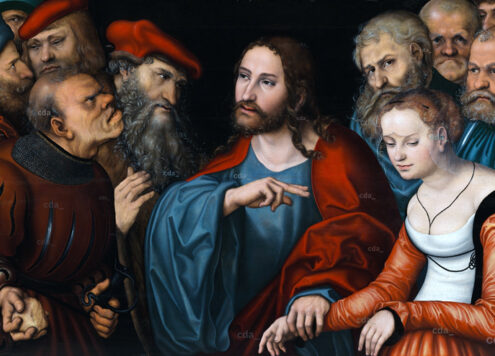In our journey through life, we’re confronted with the challenge of making our way in a world marked by division, misunderstanding or rejection. The message of Christ’s Gospel is one of unity, love, and inclusion under the reign of God. Thus, we are called to be positive, not to divide; to build up and become agents of love, not enmity. This is the heart of what Jesus told the disciple, John, who naively declared: “Teacher, we saw someone driving out demons in your name, and we told him to stop, because he was not one of us” (Mark 9: 38-41). “Do not stop him,” Jesus replied. “For no one who does a miracle in my name can in the next moment say anything bad about me. For whoever is not against us is for us. Truly I tell you, anyone who gives you a cup of water in my name… will certainly not lose their reward” (Mark 9:38-41).
At first glance, John’s concern may seem reasonable. He sees someone performing works in Jesus’ name, but this person is not part of the inner circle, not a follower of Christ in the same visible way as the apostles. His instinct is to protect the group by excluding outsiders. The disciple John’s initial reaction to exclude others reflects a common human tendency towards exclusivity and territorialism.
Jesus, however, quickly rebukes this way of thinking. “Do not stop him,” he says, offering a profound lesson in inclusivity and the universal nature of God’s kingdom. These words, “Do Not Stop Him,” serve as a powerful reminder that God’s work is not limited to our own circles or understanding. This teaching aligns beautifully with the Church’s recognition of the seeds of truth and goodness that can be found in various expressions of faith and goodwill (as articulated in Vatican II’s “Nostra Aetate”). Jesus goes further, stating that “whoever is not against us is for us.” This radical inclusivity challenges us to broaden our perspective and recognize the many ways in which God may be working through others, even those we might not immediately recognize as part of our faith community. This, I understand, was what Pope Francis was driving at when he acknowledged the various expressions of faith and goodwill in other religions.
This message is a reminder of the openness of Christ’s love. It is a call for His followers to be “for” others, not “against” them, to be positive, not negative. When we adopt a mindset of negativity, opposition and exclusion, we fail to see the work of the Holy Spirit in unexpected places. Christ’s message is not about policing who is in or out—it is about recognizing and embracing the good that comes from the pursuit of God’s will, even when it appears in surprising ways.
History has shown how exclusionary attitudes can lead to division, conflict, and even religious wars. The tragic reality is that Christian communities, through the centuries and even today in some places, have often misunderstood this lesson, leading to wars, schisms, and persecution in the name of Christianity. But this was never Christ’s intention.
To deepen our understanding of Christ’s call to positivity and inclusivity, we must also consider His teachings in Matthew 12, where He deals with another form of opposition. Here, the Pharisees accuse Him of casting out demons by the power of Beelzebub (the devil). Jesus responds with sharp rebuke, pointing out the absurdity of such a claim: “If Satan drives out Satan, he is divided against himself. How then can his kingdom stand? … But if it is by the Spirit of God that I drive out demons, then the kingdom of God has come upon you” (Matthew 12:26-28).
This passage highlights the dangers of a closed mindset that fails to recognize God’s work. Jesus exposes the hazards of obstinate unbelief. The Pharisees’ hearts are so hardened by their exclusive view of righteousness that they ascribe the clear good that Jesus was doing to evil forces. This is why Jesus warns them of the “unforgivable sin” – the blasphemy against the Holy Spirit – because they attribute the work of the Spirit to Satan. This level of spiritual blindness is dangerous, and the passage serves as a stark warning to us about the perils of judgmentalism and the importance of discernment in recognizing God’s presence in unexpected places.
It is essential to understand that while these two passages – Mark 9 and Matthew 12 – may seem contradictory, they are not. The context differs: in Mark, Jesus is emphasizing the inclusivity of His mission, welcoming those who are not visibly part of the group of disciples but are doing good in His name. In Matthew, He confronts a deliberate and malicious rejection of His mission by the Pharisees. The common thread is clear: Jesus calls us to discernment, to see where the Spirit of God is moving, and to avoid hasty judgments rooted in fear, pride, or exclusivity.
It is important to recognize that Jesus speaks harshly against those who cause scandal, particularly to the “little ones” who believe in Him. In Mark 9:42, He says: “If anyone causes one of these little ones – those who believe in me – to stumble, it would be better for them if a large millstone were hung around their necks and they were thrown into the sea.” The scandals caused by exclusivity, by arrogance, by division, and by the belief that we alone possess the fullness of truth, are profoundly damaging. Such divisions are contrary to the very Kingdom of God, where all are equals under Christ, each called to contribute to the body of Christ through love and service.
We are called to be positive, not negative–to build bridges, not walls. This doesn’t mean we abandon truth or ignore sin. But it does mean that we approach others with openness to the work of God in their lives. We are not the gatekeepers of God’s grace; we are its witnesses and participants. When we live out the love of God in our lives, shown by Christ, we show the world who we truly follow and, in that way, we help to build the Kingdom of God on earth.
How then, do we navigate a world where division and misunderstanding persist? The answer is found in Jesus’ own example. He calls us to a life of love and humility: “Love one another as I have loved you” (John 13:34). The mark of true follower is not found in exclusivity or self-righteousness, but in our Christ-like love for others.
As Jesus teaches us, “By your fruits, you will know them” (Matthew 7:20).
As we reflect on this teaching, let us commit ourselves to being agents of unity and love in a divided world. By embracing a positive, inclusive approach to our faith – one that recognizes and celebrates God’s work in all its forms – we not only enrich our own spiritual lives but also become true witnesses to the power of Christ’s love.
—Fr. Hugh Duffy, Ph.D.











10 Comments
Sharon Antonio
Thank you father for extending the messege of God
Rick Murphy
Great job describing the parrels of exclusivity and the pathway & rationale for acceptance & inclusion.
Thank you–if only this was preached from pulpits throughout the world.
Hugh Duffy
Glad you liked the blog, Rick. I thought it might be too intricate for most to follow since it involved subtle distinctions. Your comment put me at ease.
Angella Nyangoma
Good message. Thank you Father .. I have learnt to love more beyond circles.
Bartholomew Okere
Fr. Duffy, your reflection on inclusivity, being positive and not negative, building bridges instead of walls resonates with me in different ways.Jesús’ mission on earth makes the world to marvel when He preaches inclusivity and not division, Jesus went on in Jn 10:16 to talk about sheep that are not of this fold but will be taken care. But society has divided itself into left and right. Thanks!
Hugh Duffy
Good points, Bartholomew. The gospel message is meant to unite, not divide. It has been used negatively to put people against one another with drastic consequences.
Atapia Owayibuekpo Atapia
Thanks so much for your thoughtful timely message
I have been following you since last year and my ministry enjoying your messages
Remnant Grace Assembly International
WhatsApp+2348030857712
Can we place a ministerial call to our country Nigeria
Hugh Duffy
Thanks for your kind interest in my recent blog: Being Positive, Professor Atapia. I’ll give you a call on the phone number you provided.
Tom Rooney
Thank you father Hugh im reading a few times ,a lot to think on aligns with the gospel readings for me ,shines the light thoroughly
Hugh Duffy
You’re right, Tom. This was not an easy blog to write because of subtle distinctions that had to be made. I prefer my blogs to be simple, but it’s not easy to do this all the time.